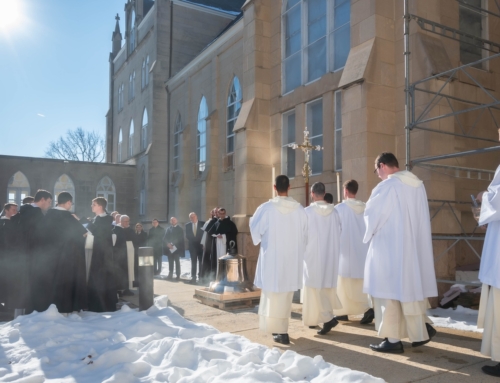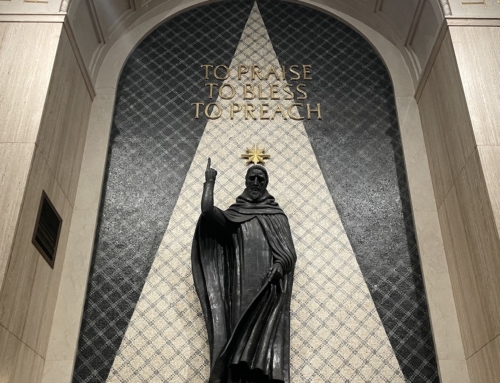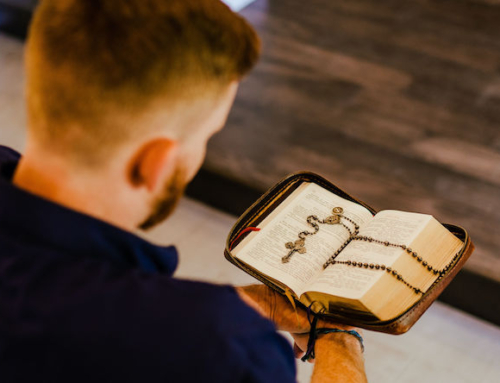An antiphon in the Liturgy of the Hours for Psalm 37 declares, “Trust in the Lord, and He will do everything for you.” The second half of this sentence usually receives a variety of emphases: “. . . He will do everything . . .” “. . . everything for you” and “. . . everything for you” are probably the most common. While all of these could be correct, it is the deeper reality evoked by the antiphon which is the most revealing.
Jesus is fully man and fully God; this succinctly expressed mystery has caused no little confusion over the past two millennia, even after it was dogmatically defined at the Council of Chalcedon in 451. This “two natures, one person” doctrine means that when Jesus walked upon the earth, He was as human as we are today: He had emotions of joy and sorrow, He needed blankets or a fire for warmth when He was cold, and when He went in the water, He got wet. He was like us in every way, but without sin (Heb 4:15). Yet Jesus was also fully God, the Second Person of the Holy Trinity; He was the Word spoken by God the Father, the Word that was God’s own self-image. As St. John the Evangelist puts it, “In the beginning was the Word, and the Word was with God, and the Word was God” (Jn 1:1). But how does the God-man come to do everything for us—and what is “everything,” anyway?
The author of the Letter to the Hebrews attributes what is said in Psalm 110:4 to Jesus: “You are a priest forever in the manner of Melchizedek” (Heb 7:17-22). Remember too that Jesus rebukes the Pharisees at Matthew 22:41-46 for missing that “my lord” in Psalm 110:1 refers to the Messiah. According to the Mosaic Law, the High Priest entered the temple once a year to offer sacrifices for his own sins and for those of the people. But in His High Priesthood, Jesus offered the perfect sacrifice, and this sacrifice lasts forever. It is this sacrifice that the priest reenacts and makes present at the Mass today, rather than offering a new sacrifice. The priest in persona Christi, in the person of Christ, offers through Christ, with Christ, and in Christ, the sacrifice of Christ; that is, the priest is Christ offering Himself as the atonement for our sins to the Father. Jesus’ eternal priesthood and sacrifice takes the place of the old, imperfect priesthood and sacrifice, and He makes it in our place and for our sake. But there’s even more to the mystery than that.
Adam, the first man, marred the very nature of humanity in his fall from grace. By disobeying God, Adam separated himself and his descendants from friendship with the Creator. It was not until God Himself became man in Christ Jesus that repairing this break was made possible for man. This was because the Word made flesh restored man’s link with God; Jesus restored something of man’s nature that had been lost through Adam. This had been impossible for man to accomplish, but in Christ whose humanity stands in the place of fallen humanity before God, man’s friendship with God was restored. It is not only Christ the priest who makes sacrifice in our place, but Christ in the very act of becoming man restores something to human nature, and re-forges the bond of friendship between God and humankind: “You are my friends if you do what I command you” (Jn 15:14).
In addition to restoring our friendship with God and making an eternal sacrifice on our behalf, Jesus also intercedes for us, and obtains for us whatever we ask for in His name. Man cannot obtain anything from God on his own. It is only Christ who obtains for us: “Jesus said to him, ‘I am the way and the truth and the life. No one comes to the Father except through me’” (Jn 14:6); and again, “Therefore, he is always able to save those who approach God through him, since he lives forever to make intercession for them” (Heb 7:25).
In today’s first reading, Paul writes in his letter to the Colossians, “For in him dwells the whole fullness of the deity bodily, and you share in this fullness in him . . . In him you were also circumcised . . . You were buried with him in baptism, in which you were also raised with him . . . [and] he brought you to life along with him” (Col 2:9-10a, 11a, 12a, 13b). We will not know all that Christ has done for us until we see Him face to face, but we should never have reason to doubt that indeed “He will do everything for you.” Therefore, we should never be sparing in our praise and thanksgiving of His mercy and kindness. As the Psalmist says, “Trust in the Lord, for His love endures forever!”
✠
Image: Natalia Goncharova, Icon painting motifs






